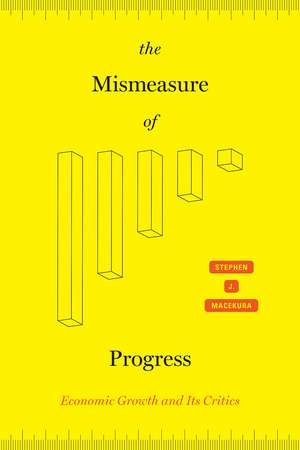The Mismeasure of Progress: Economic Growth and Its Critics
Autor Stephen J. Macekuraen Limba Engleză Hardback – 4 noi 2020
Beginning with the rise of the growth paradigm in the 1940s and 1950s and continuing through the present day, The Mismeasure of Progress is the first book on the myriad thinkers who argued against growth and the conventional way progress had been measured and defined. For growth critics, questioning the meaning and measurement of growth was a necessary first step to creating a more just, equal, and sustainable world. These critics argued that focusing on growth alone would not resolve social, political, and environmental problems, and they put forth alternate methods for defining and measuring human progress.
In today’s global political scene—marked by vast inequalities of power and wealth and made even more fraught by a global climate emergency—the ideas presented by these earlier critics of growth resonate more loudly than ever. Economic growth appealed to many political leaders because it allowed them to avoid addressing political trade-offs and class conflict. It sustained the fiction that humans are somehow separate from nonhuman “nature,” ignoring the intimate and dense connections between the two. In order to create a truly just and equitable society, Macekura argues, we need a clear understanding of our collective needs beyond growth and more holistic definitions of progress that transcend economic metrics like GDP.
Preț: 172.05 lei
Nou
Puncte Express: 258
Preț estimativ în valută:
32.92€ • 35.20$ • 27.45£
32.92€ • 35.20$ • 27.45£
Carte disponibilă
Livrare economică 28 martie-11 aprilie
Livrare express 13-19 martie pentru 32.82 lei
Preluare comenzi: 021 569.72.76
Specificații
ISBN-13: 9780226736303
ISBN-10: 022673630X
Pagini: 320
Ilustrații: 7 halftones
Dimensiuni: 152 x 229 x 28 mm
Greutate: 0.59 kg
Ediția:First Edition
Editura: University of Chicago Press
Colecția University of Chicago Press
ISBN-10: 022673630X
Pagini: 320
Ilustrații: 7 halftones
Dimensiuni: 152 x 229 x 28 mm
Greutate: 0.59 kg
Ediția:First Edition
Editura: University of Chicago Press
Colecția University of Chicago Press
Notă biografică
Stephen J. Macekura is associate professor of international studies at Indiana University’s Hamilton Lugar School of Global and International Studies.
Cuprins
Introduction: The Meaning and Measurement of Economic Growth
1 Standard of Living, GNP, and the Narrowing of National Statistics
2 Decolonization and the Limits of Economic Measurement
3 The Growth Critics
4 The Growth Paradigm in Crisis
5 The Search for Alternatives
6 Revival and Debate at the End of the Twentieth Century
Conclusion: History, Narrative, and Contemporary Growth Critics
Acknowledgments
Notes
Bibliography
Index
1 Standard of Living, GNP, and the Narrowing of National Statistics
2 Decolonization and the Limits of Economic Measurement
3 The Growth Critics
4 The Growth Paradigm in Crisis
5 The Search for Alternatives
6 Revival and Debate at the End of the Twentieth Century
Conclusion: History, Narrative, and Contemporary Growth Critics
Acknowledgments
Notes
Bibliography
Index
Recenzii
"The reader comes away persuaded that GNP, although an imperfect summary indicator of the state of an economy, plays an outsize role in contemporary conceptions of economic policy and performance."
“This book asks a profoundly important question: What counts as progress? Since the mid-twentieth century, the answer has been the narrow one: economic growth as measured by GDP. Although there have been genuine gains from higher incomes and innovation, this has undermined progress by undervaluing many kinds of work, increasing inequality to a socially intolerable degree, and hastening climate change and environmental degradation. Macekura argues convincingly that we need a better future and better measures.”
“The Mismeasure of Progress is a highly readable and informative book about the champions and critics of the idea of economic growth over the last several decades. Macekura writes with the kind of urgency and engagé spirit that makes this book not only good scholarship but an important public intervention.”
"What he brings is a unified story about the critics of GDP and the System of National Accounts told from the 1940s on, and particularly including the perspective of the economists and statisticians working on or in developing economies.”
"Macekura does an impressive job surveying the critique of ‘growth as progress’ from the earliest days to the present, and then showing how it was largely ignored. His argument is beautifully written and compelling."
